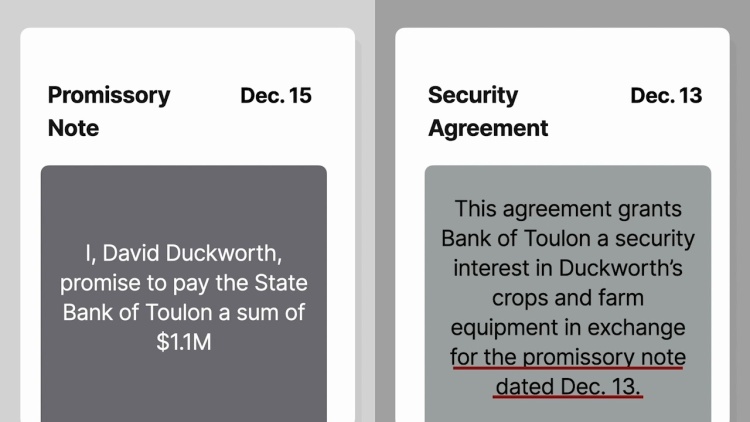In re Duckworth
United States Court of Appeals for the Seventh Circuit
586 Fed. Appx. 672, 85 U.C.C. Rep. Serv. 2d 248, 776 F.3d 453 (2014)

- Written by Josh Lee, JD
Facts
David Duckworth (defendant) borrowed $1.1 million from the State Bank of Toulon (the Bank) (plaintiff). Although this was a single transaction, the transaction included two separate documents: (1) a promissory note dated and signed on December 15, 2008, and (2) an Agricultural Security Agreement dated December 13, 2008. The security agreement granted a security interest in Duckworth’s crops and farm equipment in exchange for the promissory note. However, the security agreement referenced a promissory note dated December 13, 2008. No such note existed. The only promissory note in the transaction was the one dated December 15, 2008. Duckworth filed for bankruptcy in 2010. The Bank filed an adversary proceeding in the bankruptcy court, seeking to enforce the security agreement. To fulfill the trustee’s duty to maximize recovery for unsecured creditors, the bankruptcy trustee argued that the incorrect date made the Bank’s security agreement ineffective. The bankruptcy court disagreed, and ruled that the Bank could enforce the security agreement. The trustee appealed to the district court, which affirmed. The trustee then appealed to the United States Court of Appeals for the Seventh Circuit.
Rule of Law
Issue
Holding and Reasoning (Hamilton, J.)
What to do next…
Here's why 907,000 law students have relied on our case briefs:
- Written by law professors and practitioners, not other law students. 47,100 briefs, keyed to 996 casebooks. Top-notch customer support.
- The right amount of information, includes the facts, issues, rule of law, holding and reasoning, and any concurrences and dissents.
- Access in your classes, works on your mobile and tablet. Massive library of related video lessons and high quality multiple-choice questions.
- Easy to use, uniform format for every case brief. Written in plain English, not in legalese. Our briefs summarize and simplify; they don’t just repeat the court’s language.





